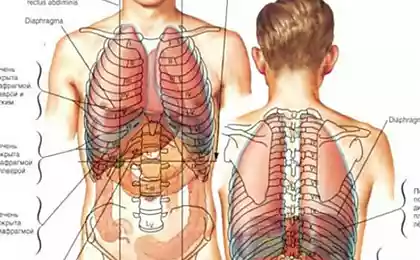165
8 things to do if someone hurts your feelings
Do not overreact to hurtful words or try to take revenge – here are a few things that will help you survive the moments when you hurt your feelings.

Each of us at least once in his life faced a situation when someone’s words or actions hurt our feelings. A sharp criticism of a colleague, a careless remark of a friend or an angry comment from a stranger on the Internet can permanently unsettle us. The first desire is to respond in kind, to protect yourself or simply to hide from the world. But psychologists say there are more effective ways to deal with the pain of someone else’s words.
Emotional pain activates the same areas of the brain as physical pain. A University of California study found that rejection causes activity in the anterior cingulate cortex and right ventrolateral prefrontal cortex — areas associated with physical pain.
Why are we so hurt by other people's words?
To understand how to properly respond to offensive words, it is important to understand the mechanism of their impact. Our psyche is structured in such a way that social rejection is perceived as a threat to survival. Thousands of years ago, expulsion from the tribe meant certain death, so evolution has “tuned” our brains to respond acutely to any signs of rejection.
Modern neuroscience studies confirm that when we are rejected or insulted, the same brain centers activate as in physical pain. That's why we say "painful to hear" or "injuring words" - these are not just metaphors, but a reflection of real processes in our brain.
Interesting fact: Studies show that taking paracetamol can reduce not only physical but also emotional pain. However, this does not mean that you need to take pills, there are healthier ways to cope with pain.
8 Effective Strategies to Respond to Offensive Words

1. Pause and take a deep breath.
The first and most important thing is not to react immediately. When we get a painful blow to ego, the limbic system, an ancient part of the brain responsible for the fight-or-flight instincts, is activated. In this state, we are unable to think rationally and often say or do things that we later regret.
The simple 4-7-8 technique will help restore control: breathe in 4 counts, hold your breath at 7, exhale at 8. Repeat it several times. This activates the parasympathetic nervous system and helps calm down.
A Harvard Medical School study found that just 90 seconds of deep breathing is enough to neutralize the release of stress hormones and restore the ability to think rationally.
2. Analyze the source of the pain
Not all hurtful words are equally painful. A remark from a person whose opinion is important to us hurts more than criticism from a casual passerby. Ask yourself, who said that? In what context? Is there any truth in these words?
Psychologist Brene Brown has found that the words that hurt us the most are those that fall into our “pain points,” areas where we feel vulnerable or insecure. When criticism is about something we doubt, it causes maximum pain.
3. Separate facts from interpretations
We often suffer not from the words themselves, but from the meaning we put into them. The phrase "you're always late" may be a simple statement of fact, but we can interpret it as "you're an irresponsible person" or "you're not respected."
Try the separation technique: Write down what was said (fact) and what you thought (interpretation). Our interpretation is often more painful than real words.
- Write down the exact words that were said.
- Mark your thoughts and feelings about it.
- Consider what other interpretations are possible.
- Choose the most objective version
4. Use the zoom-out technique.
Imagine that you are watching the situation from the sidelines as a filmmaker. Gradually “remove the camera”: first you see yourself and the interlocutor, then a room, a building, a city, a planet. This technique helps to get a broader perspective and understand how significant what happened on the scale of your life.
Studies show that people who use the zoom-out technique experience less stress and make more informed decisions. Time distance also helps: Ask yourself, will it matter in a year, five years, ten years?

5. Find a lesson in criticism
Even the harshest criticism can contain useful information. Of course, this does not mean that you should take any insults as constructive feedback. But if you separate the form from the content, sometimes you can find something valuable.
Psychologist Carol Dweck has shown in her research that people with a “growth mindset” perceive criticism as an opportunity for development, rather than an attack on their personality. This helps them recover faster from unpleasant situations and achieve great success.
6. Practice self-compassion
We are often more cruel to ourselves than to others. After painful criticism, the inner voice may begin to say, “You’re really a loser,” “Everything was right,” “You’ll never achieve anything.” It only increases the suffering.
Christine Neff’s research has shown that self-compassion is a more effective strategy than self-criticism. Talk to yourself the way you would talk to your best friend in a similar situation. What would you tell him? What kind of support?
Letter to Yourself Exercise: Write a letter to yourself on behalf of a caring friend. Describe the situation with understanding and compassion, offer support and encouragement. This exercise helps activate the complacency system in the brain.
7. Choose a constructive response
After the first emotional wave has subsided, think about your next steps. You have several options: respond, ignore, seek support, change something in yourself or a situation.
The choice depends on many factors: who said what exactly, in what situation, what is your relationship with this person. Sometimes the best answer is no answer. Sometimes it's worth talking openly. The main thing is to make a decision consciously, not under the influence of emotions.
8. Use the situation to grow
Every painful situation is an opportunity to get to know yourself better and become stronger. What does this situation say about your values, fears, desires? What's worth working on? What boundaries should be set?
Post-traumatic growth is a real phenomenon studied in psychology. People who have gone through difficulties often become more resilient, wise and compassionate. The key is not just to experience pain, but to learn from it.
When it is worth asking for help
If hurtful words or criticism seriously affect your life, interfere with work, communicate or just be happy, you should consult a specialist. This is especially important if you notice signs of depression, anxiety, or other psychological problems.
Remember: contacting a psychologist or therapist is not a sign of weakness, but a manifestation of self-care. Many successful people regularly work with mental health counselors to maintain mental health.
“No one can make you feel inferior without your consent” – the words attributed to Eleanor Roosevelt reflect an important truth: ultimately, we choose how to respond to other people’s words.
Conclusion
The ability to cope with offensive words is a skill that can and should be developed. It will help not only maintain mental health, but also build healthier relationships with others. Remember, someone else’s words reflect the inner world of the speaker more than your reality.
Practice these techniques, be patient with yourself, and don’t be afraid to ask for help when you need it. Every experience of overcoming pain makes you stronger and wiser.
Glossary
limbic system a complex of brain structures responsible for emotions, motivation, memory and learning. Includes amygdala, hippocampus and other structures.
Parasympathetic nervous system The part of the autonomic nervous system responsible for rest and recovery. It is activated by relaxation and deep breathing.
Growth setting Psychologist Carol Dweck’s concept of the belief that abilities can be developed through effort, learning, and perseverance.
Self-compassion The ability to treat yourself with kindness and understanding in times of failure or suffering as if you were a good friend to yourself.
Post-traumatic growth Positive psychological changes that can occur as a result of overcoming serious life difficulties.
Cognitive distortions Systematic errors in thinking that affect our perception of reality and can exacerbate negative emotions.
6 reasons why there are cramps in the legs
10 Ways to Turn Hard Times into the Beginning of a Better Life
























